- Home
- George MacDonald
Lilith Page 13
Lilith Read online
Page 13
In a minute or two I spied a low white shape approaching me through the vapour-dusted moonlight. It must be another beast, I thought at first, for it came slowly, almost crawling, with strange, floundering leaps, as of a creature in agony! I drew aside from its path, and waited. As it neared me, I saw it was going on three legs, carrying its left fore-paw high from the ground. It had many dark, oval spots on a shining white skin, and was attended by a low rushing sound, as of water falling upon grass. As it went by me, I saw something streaming from the lifted paw.
“It is blood!” I said to myself, “some readier champion than I has wounded the beast!” But, strange to tell, such a pity seized me at sight of the suffering creature, that, though an axe had been in my hand I could not have struck at it. In a broken succession of hobbling leaps it went out of sight, its blood, as it seemed, still issuing in a small torrent, which kept flowing back softly through the grass beside me. “If it go on bleeding like that,” I thought, “it will soon be hurtless!”
I went on, for I might yet be useful to the woman, and hoped also to see her deliverer.
I descried her a little way off, seated on the grass, with her child in her lap.
“Can I do anything for you?” I asked.
At the sound of my voice she started violently, and would have risen. I threw myself on the ground.
“You need not be frightened,” I said. “I was following the beast when happily you found a nearer protector! It passed me now with its foot bleeding so much that by this time it must be all but dead!”
“There is little hope of that!” she answered, trembling. “Do you not know whose beast she is?”
Now I had certain strange suspicions, but I answered that I knew nothing of the brute, and asked what had become of her champion.
“What champion?” she rejoined. “I have seen no one.”
“Then how came the monster to grief?”
“I pounded her foot with a stone—as hard as I could strike. Did you not hear her cry?”
“Well, you are a brave woman!” I answered. “I thought it was you gave the cry!”
“It was the leopardess.”
“I never heard such a sound from the throat of an animal! it was like the scream of a woman in torture!”
“My voice was gone; I could not have shrieked to save my baby! When I saw the horrid mouth at my darling’s little white neck, I caught up a stone and mashed her lame foot.”
“Tell me about the creature,” I said; “I am a stranger in these parts.”
“You will soon know about her if you are going to Bulika!” she answered. “Now, I must never go back there!”
“Yes, I am going to Bulika,” I said, “—to see the princess.”
“Have a care; you had better not go!—But perhaps you are—! The princess is a very good, kind woman!”
I heard a little movement. Clouds had by this time gathered so thick over the moon that I could scarcely see my companion: I feared she was rising to run from me.
“You are in no danger of any sort from me,” I said. “What oath would you like me to take?”
“I know by your speech that you are not of the people of Bulika,” she replied; “I will trust you!—I am not of them, either, else I should not be able: they never trust any one—If only I could see you! But I like your voice!—There, my darling is asleep! The foul beast has not hurt her!—Yes: it was my baby she was after!” she went on, caressing the child. “And then she would have torn her mother to pieces for carrying her off!—Some say the princess has two white leopardesses,” she continued: “I know only one—with spots. Everybody knows HER! If the princess hear of a baby, she sends her immediately to suck its blood, and then it either dies or grows up an idiot. I would have gone away with my baby, but the princess was from home, and I thought I might wait until I was a little stronger. But she must have taken the beast with her, and been on her way home when I left, and come across my track. I heard the SNIFF-SNUFF of the leopardess behind me, and ran;—oh, how I ran!—But my darling will not die! There is no mark on her!”
“Where are you taking her?”
“Where no one ever tells!”
“Why is the princess so cruel?”
“There is an old prophecy that a child will be the death of her. That is why she will listen to no offer of marriage, they say.”
“But what will become of her country if she kill all the babies?”
“She does not care about her country. She sends witches around to teach the women spells that keep babies away, and give them horrible things to eat. Some say she is in league with the Shadows to put an end to the race. At night we hear the questing beast, and lie awake and shiver. She can tell at once the house where a baby is coming, and lies down at the door, watching to get in. There are words that have power to shoo her away, only they do not always work—But here I sit talking, and the beast may by this time have got home, and her mistress be sending the other after us!”
As thus she ended, she rose in haste.
“I do not think she will ever get home.—Let me carry the baby for you!” I said, as I rose also.
She returned me no answer, and when I would have taken it, only clasped it the closer.
“I cannot think,” I said, walking by her side, “how the brute could be bleeding so much!”
“Take my advice, and don’t go near the palace,” she answered. “There are sounds in it at night as if the dead were trying to shriek, but could not open their mouths!”
She bade me an abrupt farewell. Plainly she did not want more of my company; so I stood still, and heard her footsteps die away on the grass.
CHAPTER XXII. BULIKA
I had lost all notion of my position, and was walking about in pure, helpless impatience, when suddenly I found myself in the path of the leopardess, wading in the blood from her paw. It ran against my ankles with the force of a small brook, and I got out of it the more quickly because of an unshaped suspicion in my mind as to whose blood it might be. But I kept close to the sound of it, walking up the side of the stream, for it would guide me in the direction of Bulika.
I soon began to reflect, however, that no leopardess, no elephant, no hugest animal that in our world preceded man, could keep such a torrent flowing, except every artery in its body were open, and its huge system went on filling its vessels from fields and lakes and forests as fast as they emptied themselves: it could not be blood! I dipped a finger in it, and at once satisfied myself that it was not. In truth, however it might have come there, it was a softly murmuring rivulet of water that ran, without channel, over the grass! But sweet as was its song, I dared not drink of it; I kept walking on, hoping after the light, and listening to the familiar sound so long unheard—for that of the hot stream was very different. The mere wetting of my feet in it, however, had so refreshed me, that I went on without fatigue till the darkness began to grow thinner, and I knew the sun was drawing nigh. A few minutes more, and I could discern, against the pale aurora, the wall-towers of a city—seemingly old as time itself. Then I looked down to get a sight of the brook.
It was gone. I had indeed for a long time noted its sound growing fainter, but at last had ceased to attend to it. I looked back: the grass in its course lay bent as it had flowed, and here and there glimmered a small pool. Toward the city, there was no trace of it. Near where I stood, the flow of its fountain must at least have paused!
Around the city were gardens, growing many sorts of vegetables, hardly one of which I recognised. I saw no water, no flowers, no sign of animals. The gardens came very near the walls, but were separated from them by huge heaps of gravel and refuse thrown from the battlements.
I went up to the nearest gate, and found it but half-closed, nowise secured, and without guard or sentinel. To judge by its hinges, it could not be farther opened or shut closer. Passing through, I looked down a long ancient street. It was utterly silent, and with scarce an indication in it of life present. Had I come upon a dead city? I turned and went
out again, toiled a long way over the dust-heaps, and crossed several roads, each leading up to a gate: I would not re-enter until some of the inhabitants should be stirring.
What was I there for? what did I expect or hope to find? what did I mean to do?
I must see, if but once more, the woman I had brought to life! I did not desire her society: she had waked in me frightful suspicions; and friendship, not to say love, was wildly impossible between us! But her presence had had a strange influence upon me, and in her presence I must resist, and at the same time analyse that influence! The seemingly inscrutable in her I would fain penetrate: to understand something of her mode of being would be to look into marvels such as imagination could never have suggested! In this I was too daring: a man must not, for knowledge, of his own will encounter temptation! On the other hand, I had reinstated an evil force about to perish, and was, to the extent of my opposing faculty, accountable for what mischief might ensue! I had learned that she was the enemy of children: the Little Ones might be in her danger! It was in the hope of finding out something of their history that I had left them; on that I had received a little light: I must have more; I must learn how to protect them!
Hearing at length a little stir in the place, I walked through the next gate, and thence along a narrow street of tall houses to a little square, where I sat down on the base of a pillar with a hideous bat-like creature atop. Ere long, several of the inhabitants came sauntering past. I spoke to one: he gave me a rude stare and ruder word, and went on.
I got up and went through one narrow street after another, gradually filling with idlers, and was not surprised to see no children. By and by, near one of the gates, I encountered a group of young men who reminded me not a little of the bad giants. They came about me staring, and presently began to push and hustle me, then to throw things at me. I bore it as well as I could, wishing not to provoke enmity where wanted to remain for a while. Oftener than once or twice I appealed to passers-by whom I fancied more benevolent-looking, but none would halt a moment to listen to me. I looked poor, and that was enough: to the citizens of Bulika, as to house-dogs, poverty was an offence! Deformity and sickness were taxed; and no legislation of their princess was more heartily approved of than what tended to make poverty subserve wealth.
I took to my heels at last, and no one followed me beyond the gate. A lumbering fellow, however, who sat by it eating a hunch of bread, picked up a stone to throw after me, and happily, in his stupid eagerness, threw, not the stone but the bread. I took it, and he did not dare follow to reclaim it: beyond the walls they were cowards every one. I went off a few hundred yards, threw myself down, ate the bread, fell asleep, and slept soundly in the grass, where the hot sunlight renewed my strength.
It was night when I woke. The moon looked down on me in friendly fashion, seeming to claim with me old acquaintance. She was very bright, and the same moon, I thought, that saw me through the terrors of my first night in that strange world. A cold wind blew from the gate, bringing with it an evil odour; but it did not chill me, for the sun had plenished me with warmth. I crept again into the city. There I found the few that were still in the open air crouched in corners to escape the shivering blast.
I was walking slowly through the long narrow street, when, just before me, a huge white thing bounded across it, with a single flash in the moonlight, and disappeared. I turned down the next opening, eager to get sight of it again.
It was a narrow lane, almost too narrow to pass through, but it led me into a wider street. The moment I entered the latter, I saw on the opposite side, in the shadow, the creature I had followed, itself following like a dog what I took for a man. Over his shoulder, every other moment, he glanced at the animal behind him, but neither spoke to it, nor attempted to drive it away. At a place where he had to cross a patch of moonlight, I saw that he cast no shadow, and was himself but a flat superficial shadow, of two dimensions. He was, nevertheless, an opaque shadow, for he not merely darkened any object on the other side of him, but rendered it, in fact, invisible. In the shadow he was blacker than the shadow; in the moonlight he looked like one who had drawn his shadow up about him, for not a suspicion of it moved beside or under him; while the gleaming animal, which followed so close at his heels as to seem the white shadow of his blackness, and which I now saw to be a leopardess, drew her own gliding shadow black over the ground by her side. When they passed together from the shadow into the moonlight, the Shadow deepened in blackness, the animal flashed into radiance. I was at the moment walking abreast of them on the opposite side, my bare feet sounding on the flat stones: the leopardess never turned head or twitched ear; the shadow seemed once to look at me, for I lost his profile, and saw for a second only a sharp upright line. That instant the wind found me and blew through me: I shuddered from head to foot, and my heart went from wall to wall of my bosom, like a pebble in a child’s rattle.
CHAPTER XXIII. A WOMAN OF BULIKA
I turned aside into an alley, and sought shelter in a small archway. In the mouth of it I stopped, and looked out at the moonlight which filled the alley. The same instant a woman came gliding in after me, turned, trembling, and looked out also. A few seconds passed; then a huge leopard, its white skin dappled with many blots, darted across the archway. The woman pressed close to me, and my heart filled with pity. I put my arm round her.
“If the brute come here, I will lay hold of it,” I said, “and you must run.”
“Thank you!” she murmured.
“Have you ever seen it before?” I asked.
“Several times,” she answered, still trembling. “She is a pet of the princess’s. You are a stranger, or you would know her!”
“I am a stranger,” I answered. “But is she, then, allowed to run loose?”
“She is kept in a cage, her mouth muzzled, and her feet in gloves of crocodile leather. Chained she is too; but she gets out often, and sucks the blood of any child she can lay hold of. Happily there are not many mothers in Bulika!”
Here she burst into tears.
“I wish I were at home!” she sobbed. “The princess returned only last night, and there is the leopardess out already! How am I to get into the house? It is me she is after, I know! She will be lying at my own door, watching for me!—But I am a fool to talk to a stranger!”
“All strangers are not bad!” I said. “The beast shall not touch you till she has done with me, and by that time you will be in. You are happy to have a house to go to! What a terrible wind it is!”
“Take me home safe, and I will give you shelter from it,” she rejoined. “But we must wait a little!”
I asked her many questions. She told me the people never did anything except dig for precious stones in their cellars. They were rich, and had everything made for them in other towns.
“Why?” I asked.
“Because it is a disgrace to work,” she answered. “Everybody in Bulika knows that!”
I asked how they were rich if none of them earned money. She replied that their ancestors had saved for them, and they never spent. When they wanted money they sold a few of their gems.
“But there must be some poor!” I said.
“I suppose there must be, but we never think of such people. When one goes poor, we forget him. That is how we keep rich. We mean to be rich always.”
“But when you have dug up all your precious stones and sold them, you will have to spend your money, and one day you will have none left!”
“We have so many, and there are so many still in the ground, that that day will never come,” she replied.
“Suppose a strange people were to fall upon you, and take everything you have!”
“No strange people will dare; they are all horribly afraid of our princess. She it is who keeps us safe and free and rich!”
Every now and then as she spoke, she would stop and look behind her.
I asked why her people had such a hatred of strangers. She answered that the presence of a stranger defiled the city.
“How is that?” I said.
“Because we are more ancient and noble than any other nation.—Therefore,” she added, “we always turn strangers out before night.”
“How, then, can you take me into your house?” I asked.
“I will make an exception of you,” she replied.
“Is there no place in the city for the taking in of strangers?”
“Such a place would be pulled down, and its owner burned. How is purity to be preserved except by keeping low people at a proper distance? Dignity is such a delicate thing!”
She told me that their princess had reigned for thousands of years; that she had power over the air and the water as well as the earth—and, she believed, over the fire too; that she could do what she pleased, and was answerable to nobody.
When at length she was willing to risk the attempt, we took our way through lanes and narrow passages, and reached her door without having met a single live creature. It was in a wider street, between two tall houses, at the top of a narrow, steep stair, up which she climbed slowly, and I followed. Ere we reached the top, however, she seemed to take fright, and darted up the rest of the steps: I arrived just in time to have the door closed in my face, and stood confounded on the landing, where was about length enough, between the opposite doors of the two houses, for a man to lie down.
Weary, and not scrupling to defile Bulika with my presence, I took advantage of the shelter, poor as it was.
CHAPTER XXIV. THE WHITE LEOPARDESS
At the foot of the stair lay the moonlit street, and I could hear the unwholesome, inhospitable wind blowing about below. But not a breath of it entered my retreat, and I was composing myself to rest, when suddenly my eyes opened, and there was the head of the shining creature I had seen following the Shadow, just rising above the uppermost step! The moment she caught sight of my eyes, she stopped and began to retire, tail foremost. I sprang up; whereupon, having no room to turn, she threw herself backward, head over tail, scrambled to her feet, and in a moment was down the stair and gone. I followed her to the bottom, and looked all up and down the street. Not seeing her, I went back to my hard couch.

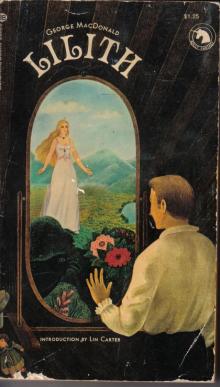 Lilith: A Romance
Lilith: A Romance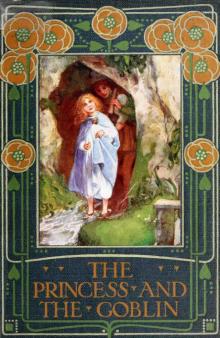 The Princess and the Goblin
The Princess and the Goblin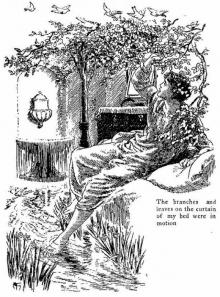 Phantastes: A Faerie Romance for Men and Women
Phantastes: A Faerie Romance for Men and Women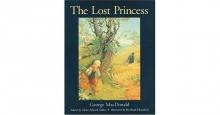 A Double Story
A Double Story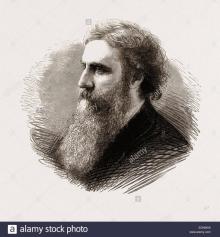 St. George and St. Michael
St. George and St. Michael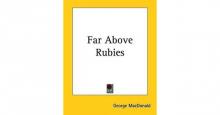 Far Above Rubies
Far Above Rubies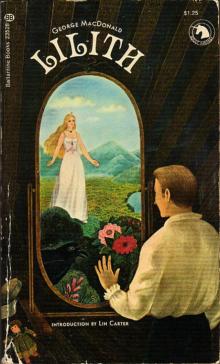 Lilith
Lilith